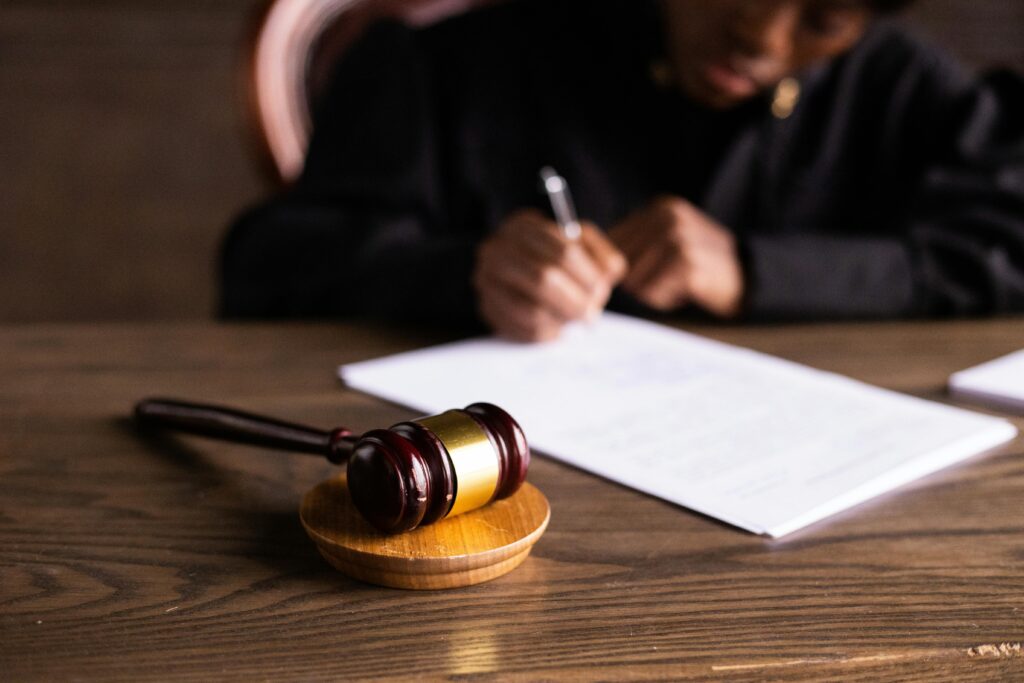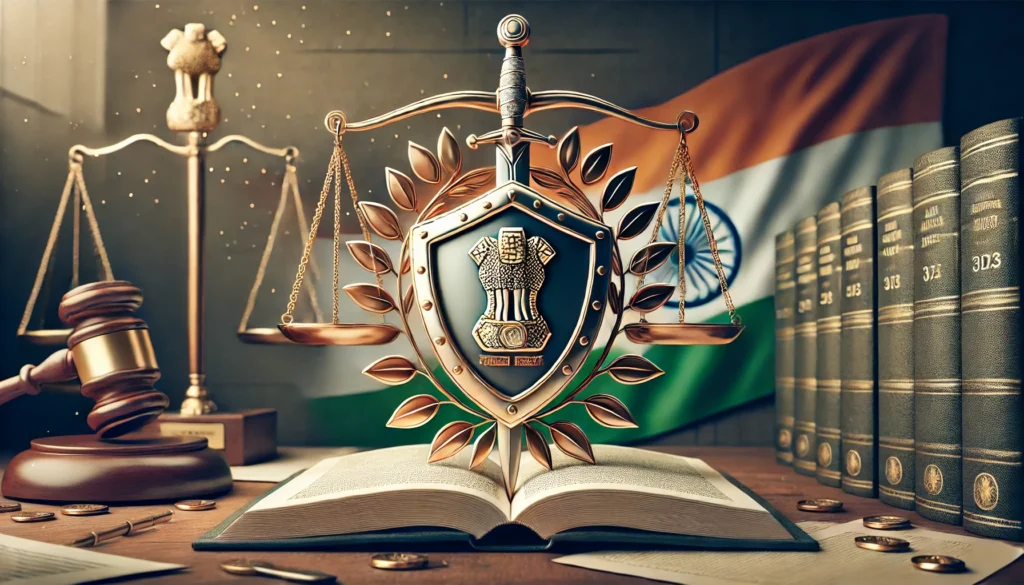Published on 11th April 2025
Authored By: M.Vijayalakshmi
Chennai: Dr. Ambedkar Government Law College, Pudupakkam.
Supreme Court of India
Joginder Kumar vs State Of U.P on 25 April, 1994
Equivalent citations: 1994 AIR 1349, 1994 SCC (4) 260
Bench: Venkatachalliah, M.N.(Cj)
PETITIONER: JOGINDER KUMAR
Vs.
RESPONDENT: STATE OF U.P.
DATE OF JUDGMENT25/04/1994
BENCH: VENKATACHALLIAH M.N.(CJ), MOHAN S. (J), ANAND A.S. (J)
CITATION: 1994 AIR 1349, 1994 SCC (4) 260, JT 1994 (3) 423, 1994 SCALE (2)662
Facts of the case
On 7th January 1994, Joginder Kumar, a lately enrolled advocate, was summoned by the elderly supervisor of Police (SSP), Ghaziabad, Respondent 4 for inquiries related to an unidentified case. Joginder appeared at the SSP’s office around 1000 AM, accompanied by his four sisters. still, rather of conducting a straightforward inquiry, the SSP detained Joginder Kumar.
Still, in response to a series of entreaties by his sisters, he was assured to be released in the evening when preliminary inquiries would have been made; this promise came to pass not. Joginder’s family got less worried for his safety over time. As early as at 1255 PM, despairing for Joginder’s life, and feeling something was up that was against Joginder, they sent a telegram to the Chief Minister of Uttar Pradesh. The telegram expressed enterprises that Joginder might be involved in a criminal case or, worse, become a victim of a false hassle. By the evening of 7th January, it was evident that Joginder hadn’t been released and his whereabouts were still not known. The next day, a report appeared that Joginder was in the illegal custody of the Station House Officer (SHO) of Mussoorie Police Station, Respondent 5. Even after this revelation, Joginder had not yet been produced before any judge. The SHO recommended that Joginder’s cousins seek directions for releasing him from the SSP, Ghaziabad.
On 9 January 1994, Joginder’s family was getting more despairing and met the Mussoorie Police Station in the evening to inquire of his well-being. yet still, they find that Joginder had been taken to an un known posting. This fact pattern, exemplified by detention without cause, and a general lack of transparency is what made the family of Joginder Kumar initiate a writ solicitation under Articles 32 of the Constitution of India, seeking urgent release.
Issues
The issues involved in Joginder Kumar vs State of UP were
defense for Arrest Can an arrest be justified simply by the actuality of the power to do so? Does an arrest bear reasonable grounds and defense beyond bare suspicion? Detention Without product Before Magistrate Is it legal to detain a person without instantly producing them before a justice? What are the legal counteraccusations of similar detention? Protection of Individual Liberty What are the native protections against arbitrary arrest and detention? How should these protections be implemented?
Arguments of Petitioner
For the Petitioner Illegal Detention Joginder Kumar was detained without any formal charges or leave. This is the illegal detention on his part as he wasn’t produced before a justice within the quested 24-hour period. Therefore, his rights under Articles 21 and 22 of the Constitution are violated. Abuse of Power The repliers misused their authority when they kept Joginder in guardianship without having any legal base. The detention was arbitrary as it aimed at importunity rather than licit inquiry. Violation of Fundamental Rights The detention violated Joginder’s right to life and particular liberty (Composition 21). His right to be informed of the grounds of his arrest and to consult a legal guru of his choice (Composition 22) was also infringed.
Arguments of Respondent
For the Respondents Lawful Detention The repliers contended that their detention was within the rights and necessary for disquisition. They argued that Joginder was detained to help him from lamming and to insure a thorough inquiry. Public Interest The repliers contended that the detention was in the public interest, they emphasized that some investigative procedures required detaining suspects for further extended ages.
Judgement of the case
Joginder Kumar vs State of UP Judgement
In the case of Joginder Kumar vs State of UP, the Supreme Court of India dealt with various important questions about the power of arrest and individual liberty. It recognized substantial abuses of the powers of arrest by the police officers and established guidelines to check similar arbitrary conduct.
Distinction Between Power and Justification
The Court in Joginder Kumar v. State of UP made a distinction of crucial significance between the power to arrest and the defence for exercising that power. It emphasised that bare actuality of the power to arrest doesn’t justify the exercise of such power. Apprehensions should be made founded on reasonable satisfaction and substantiation, consequent to full disquisition and exploration.
Rules on Arrest
Apprehensions should not be made in every case involving a cognizable offence. An arrest cannot be made simply because it is legal for a police officer to do so. Arrests must be avoided in non-heinous offenses if a notice to attend the police station can suffice. There must be reasonable defense and belief regarding the person’s involvement in the offense and the necessity of the arrest.
Protection of indigenous rights
The Court, in Joginder Kumar vs State of UP emphasized that protection of rights arising out of Articles 21 and 22 is to be safeguarded. Every arrested person is entitled to have a friend or relative informed of his arrest and detention. This right must be communicated to the arrested person when brought to the police station. An entry must be made in the journal about who was informed of the arrest.
Role of Magistrates
It is the duty of the magistrate, before whom the arrested person is presented, to ensure these guidelines are followed.
Magistrates must satisfy themselves that the police have complied with the procedural safeguards and constitutional protections.
Guidelines of the Supreme Court in Joginder Kumar vs State of UP
Information to Cousins musketeers An arrested person in detention by custodianship is entitled, if he so desires, to have his friend, relative or any other person informed of his arrest and place of detention. He/she is required to read to the person under arrest when brought to police station about their right to not make a self-incrimination. An entry has to be made in journal who informs about arrest. This gives translucency and responsibility also in arrest. Judicial Justice before whom arrested person brought should confirm whether the person informed. This judicial oversight aims to help arbitrary detention and cover individual liberty. Reasonable defense for Arrest Apprehensions must be made anchored upon reasonable satisfaction pertaining to the fictitiousness of the complaint and the person’s involvement in the offence. Arbitrary apprehensions based on bare dubitation or allegations should not be executed. Cognizable Offences
The Court in Joginder Kumar versus State of UP also clarified the conception of cognizable offences. A cognizable offence is one where a police officer can take cognizance and arrest a suspect without a leave if they’ve “reason to believe” that the person has committed the offence. The officer must be satisfied that the arrest is necessary on certain enumerated bases.
still, within 24 hours of the arrest, the officer must have the detention ratified by a judicial justice. Such demand ensures that both the arrest and detention are put under judicial scrutiny, thereby precluding its potential abuse by the police.
Cognizable Offences
The Court in Joginder Kumar v. State of UP also explained the concept of cognizable offences. A cognizable offence is that offence for which a police officer can take cognizance and arrest a person without leave if they have “reason to believe” that the person has committed the offence. The officer must be satisfied that the arrest is necessary on some of the enumerated bases.
However, within 24 hours of the arrest, the detention should be ratified by the judicial justice. This demand ensures that the arrest and detention are subordinated to judicial scrutiny, precluding abuse of power by the police.
Case Summary
The Supreme Court held in Joginder Kumar vs. State of U.P. (1994) that police do abuse their powers of arrest and apprehensions must be justified beyond bare dubitation
. Joginder Kumar was a youthful advocate who was detained without even charges or leave, hence a writ solicitation under Composition 32.
The Supreme Court in Joginder Kumar v State of UP ruled that apprehensions should be based on reasonable belief and substantiation, not routinely or arbitrarily. Guidelines were issued calling for the detained individualities to be informed of their rights, to have a friend or relative notified, and be presented before a justice within 24 hours. This judgment confirmed indigenous protections under Articles 21 and 22, freezing police responsibility and judicial oversight to help unlawful detention.
Conclusion
The Supreme Court in this case laid down the guidelines for arrest. The guidelines were regarding two aspects originally, arrest shouldn’t be routinely and secondly, a person should be informed about their arrest. These guidelines have been included in the Criminal Procedure Code, 1973 (CrPC) after the correction in CrPC.
Reference
1.Joginder kumar vs state of up.., https://lawbhoomi.com/joginder-kumar-vs-state-of-up/.
2.Author: S Mohan, Joginder Kumar vs State Of U.P on 25 April, 1994, https://indiankanoon.org/doc/768175/.




